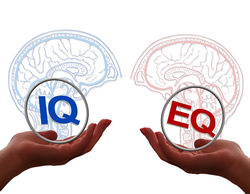LaRae Quy* says emotional intelligence can teach us how to express, understand and manage our emotions and those of other people.
 The first thing I learned as an FBI agent was that I would need to be emotionally intelligent if I planned to live long enough to spend my retirement pension.
The first thing I learned as an FBI agent was that I would need to be emotionally intelligent if I planned to live long enough to spend my retirement pension.
Agents who are emotionally intelligent have the ability to read the emotions of others before a gun is drawn or a fist is thrown.
They also develop self-awareness so they can predict their response when confronted with the unknown.
If you watch enough Marvel-inspired movies, you might think all superheroes swagger into a room, take control of the situation by intimidation or force, and knock the sh*t out of anyone who doesn’t play by their rules.
The other extreme is the Hallmark TV channel where complex problems are solved in short, sappy, and sweet conversations.
Most of us live life somewhere in between: we’re not superheroes nor are we chumps content with vacuous responses.
We want to be emotionally intelligent so we can learn how to express, understand, and manage the emotions — of ourselves and others.
Here are four things you need to know if you want to be emotionally intelligent:
- Emotional intelligence allows you to manage your emotions
Emotions are important information for us and can be used to help us navigate volatile landscapes as we move into the unknown.
Self-awareness is your ability to accurately perceive your emotions and stay aware of them.
The more you understand your emotions, the easier it will be to tame them and direct your behaviour in a positive way.
It’s vital that you look at your weaknesses and shortcomings in the eye so they don’t sabotage you when you least expect it.
Mental toughness is being unafraid to address your weaknesses with the same enthusiasm and vigour as you explore your strengths.
When you manage your emotions, you can leverage anxiety and stress.
Anxiety is often seen as a negative emotion, but it’s a necessary one to spur us to action.
Too much blocks achievement, while too little saps our energy.
It’s important that you not judge the emotion you’ve experienced as either good or bad — it is what it is.
Be honest about the emotion and stay aware of it.
This will allow the thinking, cerebral brain to catch up with the fast-moving and emotional limbic brain system.
This gives you time to gain control of your emotion so you can craft your response.
- Emotional intelligence allows you to place yourself in other people’s shoes
While self-awareness is one aspect of emotional intelligence, it’s also important to understand what makes other people tick.
Social awareness is your ability to pick up on the emotions of others.
To be emotionally intelligent, you need to use that awareness to place yourself in their shoes so you see life from their perspective.
This can be important in situations where you need to empathise with customers or interact with people who have strong opinions of their own.
Empathy is the ability to share and understand the emotions of others.
It’s important because it helps you understand how others are feeling so you can respond appropriately to the situation.
- Emotional intelligence allows you to see situations as a challenge, not a roadblock
If you perceive the adversity in front of you as a roadblock, your negative reaction to the obstacle will be the one thing you focus on.
If you’re an emotionally intelligent person, you’ll interpret your emotion as a cue to take action and deal with the challenge rather than think of yourself as a victim of your circumstances.
The more you use negative language and second-guess yourself, the less free your mind will be to roam through creative solutions to problems.
These outcomes will only further cause you to doubt yourself, leading to a negative, downward spiral.
Ask yourself some basic questions:
- Are my thoughts factual, or are my interpretations based on presumptions?
- Have I jumped to inaccurate conclusions?
- What is the evidence for and against those conclusions?
- How can I find out if my thoughts are actually true?
- Which behaviours will reflect my strengths in this situation?
- Which of my core competencies need to be strengthened at this time?
- Emotional intelligence can be increased
The good news is that emotional intelligence can be learned.
Neural plasticity is our brain’s ability to change over time.
Each time we discover new emotional intelligence skills, new neurons link the limbic and cerebral brains together like a cable.
The chain reaction of growth ensures that new behaviour can kick into action at a faster rate in the future.
These new pathways turn into habits over time, and those behaviours create new circuitry that will eventually become your brain’s default response.
Intentionally practise each new emotional intelligence skill you learn for three to six months.
This will train your brain to hardwire new pathways of thinking so that they turn into habits.
Habits begin to be hardwired the very first time you practise them.
* LaRae Quy is a former FBI counterintelligence agent and consultant with the Mental Toughness Center. She tweets at @LaRaeQuy. Her website is LaRaeQuy.com.
This article first appeared at laraequy.com/blog.











